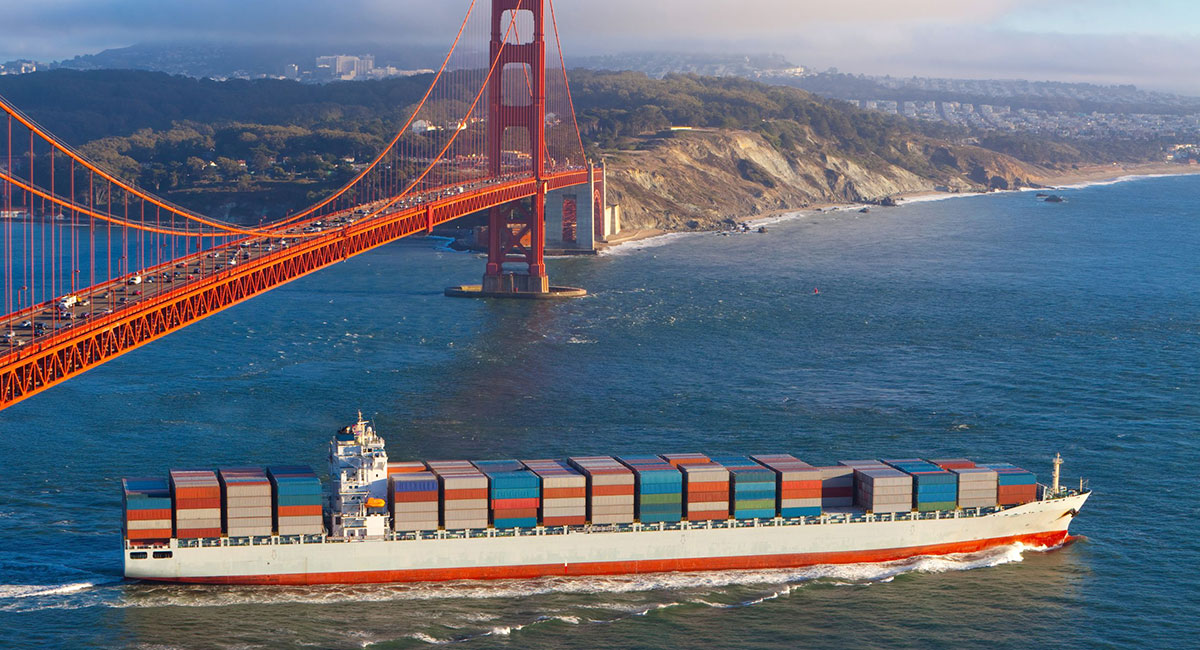It is true, as Oren Cass notes in his opening essay, that the Ricardian theory of comparative advantage enjoys widespread consensus among economists. Unfortunately, this may be the only accurate claim in his entire argument.
Cass is convinced that “something has gone wrong” with the American economy. Incensed that the United States has run a deficit between its imports and exports in recent decades, he places the blame for this trade “imbalance” on economists’ embrace of comparative advantage, and their corollary aversion to protectionist tariffs.
I’ll defer to the other respondents in this series to address the economic fallacies of balance-of-trade alarmism. My aim in this essay is to examine the historical claims of Cass’s essay. His historical account shares much in common with the fashionable far-left academic genre of “neoliberalism” studies. Free trade, we are told, emerged as a consensus viewpoint after World War II, not for its validity in practice but because it offered a convenient rationalization for something called the “neoliberal geopolitical agenda.” Its defenders today, by implication, are either complicit in that agenda or adherents of an economic mysticism that uncritically elevates the comparative advantage to a matter of dogma.
Cass begins his historical account with a novel claim. “For more than a century after Ricardo introduced the concept of comparative advantage,” he maintains, “no one much cared.” This peculiar claim is belied by Charles F. Bastable’s The Theory of International Trade, one of the first trade-specific economic textbooks, which spelled out the mechanics of Ricardian trade theory in exacting detail in 1887. Cass would rather focus our attention though on Alfred Marshall’s classic Principles of Economics, published in 1890.
In his rendering, Marshall comes across as something of a skeptic of comparative advantage who allegedly “chastised the Ricardians” for their theories about trade. To argue his point he excerpts a passage wherein Marshall allegedly condemned comparative advantage for having “laid down laws with regard to profits and wages that did not really hold even for England in their own time.” Turning to Marshall’s original text, we quickly discover that Cass has either misread or misrepresented the economist’s words. The passage in full reads:
And though this did little harm so long as they were treating of money and foreign trade, it led them astray as to the relations between the different industrial classes. It caused them to speak of labour as a commodity without staying to throw themselves into the point of view of the workman; and without dwelling upon the allowances to be made for his human passions, his instincts and habits, his sympathies and antipathies, his class jealousies and class adhesiveness, his want of knowledge and of the opportunities for free and vigorous action. They therefore attributed to the forces of supply and demand a much more mechanical and regular action than is to be found in real life: and they laid down laws with regard to profits and wages that did not really hold even for England in their own time.(emphasis added)
We accordingly find that Marshall’s grievance is not with Ricardian comparative advantage, but rather Ricardo’s other writings on the economics of labor and the conditions of the working classes in early nineteenth century England. Indeed, when Marshall penned a more detailed work on trade economics in 1919, it offered a conventional Ricardian account of comparative advantage.
Misrepresented quotations make for an inauspicious start to Cass’s historical journey, particularly when the prevalence of Ricardian trade theory is easily verifiable in nineteenth-century economic sources. To complete his argument, Cass turns next to a posited alternative origin story. Comparative advantage, he maintains, came not from economic acceptance but an international conspiracy theory. “[T]he case for free trade,” he tells us, was once properly recognized by Americans as “emanating from Britain as a self-serving ideology, not a universal principle.” The post-World War II embrace of free trade, it follows, is predicated on a myth that supplanted and suppressed an alternative path, an “American System” of aggressive protectionism and conscious industrial cultivation.
While Cass presents himself as recovering this suppressed economic history from myth-making free-trade economists, his story is far from novel. It’s a hoary old tale with roots in the Anglophobic and nativist politics of the mid-nineteenth century. It fell outside of mainstream political discussion as US-British relations were transformed into a stable alliance by the two world wars, although it survived on the extreme periphery of American politics through its late twentieth-century cultivation by the Lyndon LaRouche movement. Only recently has the National Conservative movement attempted to revitalize the notion that free trade was a British invention of convenience, but they are building on a century and a half of similar claims.
A central claim of Cass’s thesis is that the early United States represented a sharp intellectual break from the economic theories of Britain, and that this forgotten path propelled the United States into an industrial power over the nineteenth century. Even on its surface, this account is laden with oversimplification and anachronism. Allegedly, free-trade Britain did not become so until 1846, when it repealed the heavily protectionist Corn Laws and predecessor policies that had wedded the empire to the very same Mercantilistic ideology that Cass espouses today. The repeal of the Corn Laws was indeed an intellectual triumph of the Ricardians, though it was also one that played out on both sides of the Atlantic. The United States adopted the free trade-friendly Walker Tariff of 1846 in direct conjunction with Richard Cobden and John Bright’s trade liberalization campaign, and maintained these policies until the Civil War.
Neither was protectionism a particularly pronounced feature of the American founding. Among the major figures of the founding generation, Alexander Hamilton stands alone in the protectionist camp. Although Hamilton laid out a case for pro-industrial tariffs and bounties in his famous 1791 Report on Manufactures, the legislative action that followed was a far cry from what Cass envisions. Most of Hamilton’s industrial bounties failed to obtain congressional approval, and his tariff schedule only imposed modest rates at levels that were more conducive to generating tax revenue than excluding imports.
To build his case for a distinctive “American System,” Cass must instead turn to the political program of the same name that Sen. Henry Clay outlined in a(n in)famous 1824 speech to Congress. Clay certainly outlined an aggressive platform of interventionist economic policies, including widescale “internal improvements” spending, prohibitive tariffs against competing import goods, and liberal reliance on debt financing to pay for it all. When he realized that this import substitution scheme and infrastructure projects would bolster the plantation system of the American South, Clay appended his scheme with the policy of removing the enslaved population of the United States by colonizing African Americans in Liberia and other foreign locales. In all aspects of political life, Clay was wedded to government planning—much of it impractical, and all of it immensely expensive.
Far from being a successor to the founding generation, Clay’s “American System” represented a sharp break from the limited government philosophy that guided the early republic. An elderly James Madison was aghast when he received a copy of Clay’s 1824 speech, and wrote the senator to protest that his bill placed the government in the position of picking economic winners and losers. Thomas Jefferson went even further, denouncing Clay’s system as unconstitutional and drafting a proposed resolution stating as much for the Virginia Assembly.
In practice, Clay’s proposals spawned decades of political turmoil as Congress vacillated between high and low tariff regimes until the aforementioned Walker Tariff settlement in 1846. Unmentioned by Cass, the American System became synonymous with public corruption and graft. Since protectionist tariffs offer a substantial economic boon to domestic producers, almost every tariff schedule revision turned into a free-for-all of bribery and favor-trading as lobbyists descended on Washington to secure preferential rates. The reason stems from the economic inefficiency of this trade policy instrument, and its propensity to cater to the very same pattern of factionalization that Madison warned about in the Federalist Papers.
In economic terms, tariffs deliver a “rent” by transferring a portion of the consumer surplus from exchange to beneficiary producers who no longer face import competition. The collective action advantages of concentrated interest groups enable lobbying efforts to coalesce around tariff-benefitting industries, which then divert resources away from productive economic activities and into seeking favors through the political system. On net, the concentrated benefits received by politically savvy industries are dwarfed by the combination of deadweight losses on consumers and political losses due to rent-seeking to obtain more tariffs.
Indeed, this exact pattern of favor-trading and corruption led to the Morrill Tariff of 1861, which Cass celebrates for entrenching Clay’s American System-style high tariff regime in the second half of the nineteenth century. His case for this corruption-laden law rests on an extended exercise in the post hoc ergo propter hoc fallacy. Since the United States attained industrial prosperity between the Civil War and 1929, Cass contends, the protectionist tariff regime simply must have been the cause.
Except this claim collapses under empirical scrutiny. As Douglas Irwin has shown, the claimed correlations between late nineteenth-century American industrialization and protectionism are both exaggerated and spurious. Economic growth in sectors that did not face heavy import-competition—think of transportation, communication, and utilities—generally outpaced the tariff-beneficiaries of industrial manufacturing. The United States also had the unique advantage of a large, geographically diverse internal commercial base in this period. Nor were tariffs the unambiguous benefit to industry that Cass claims. They raised the prices on imported capital goods like heavy machinery, which likely impaired many of the same industries that benefited from tariffs on their own goods.
Notably, Cass’s historical tale of the age of American tariffs ends with a whimper in 1929. Most readers will recognize this year for the stock market crash that triggered the Great Depression. There’s more to the story than Cass lets on though. Panicked by the downturn, the United States Congress attempted to enact a counter-recessionary stimulus package by turning directly to the Henry Clay playbook. In 1930, they enacted the ultra-protectionist Smoot-Hawley Tariff Act, believing it would insulate American industry from the global downturn. As with prior tariff schedule revisions, Smoot-Hawley unleashed a flood of lobbyists upon Washington as producers scrambled to receive preferential rates. The resulting monstrosity of a bill raised tariffs to their highest levels in the industrial era. Instead of enabling American industry to weather the depression, Clay’s economic philosophy proved to be one of the greatest legislative blunders of American history. The new tariff schedule’s costs were largely passed through onto consumers, already suffering from the downturn, and in particular onto agricultural exporters through symmetry effects. Next, the American tariff triggered a global trade war of retaliatory measures abroad. Worldwide commerce collapsed to a fraction of its 1929 level over the next three years. The unfolding Depression attained its moniker of “Great” from the very same policies that Cass extolls today.
What we’re left with, unfortunately, is a historical account that is both incomplete and misinformed. Cass presents himself as a truth-teller, arguing against a suppressed tradition of American System protection that allegedly delivered America to economic greatness, only to find its legacy assailed and obscured by free trade dogmatists in the economics profession. In reality, his position has more in common with a nineteenth-century miasma theorist in a modern medical school, expressing bewilderment that those around him are unconvinced by antiquated theories attributing disease to bad odors drifting in through the air.









